Submitted by Biswajit Chakrabarty
"Design happens at every stage, it's a process" says RSP Dubai Managing Director Michael Magill
United Arab Emirates Architecture News - Dec 13, 2020 - 12:30 8313 views
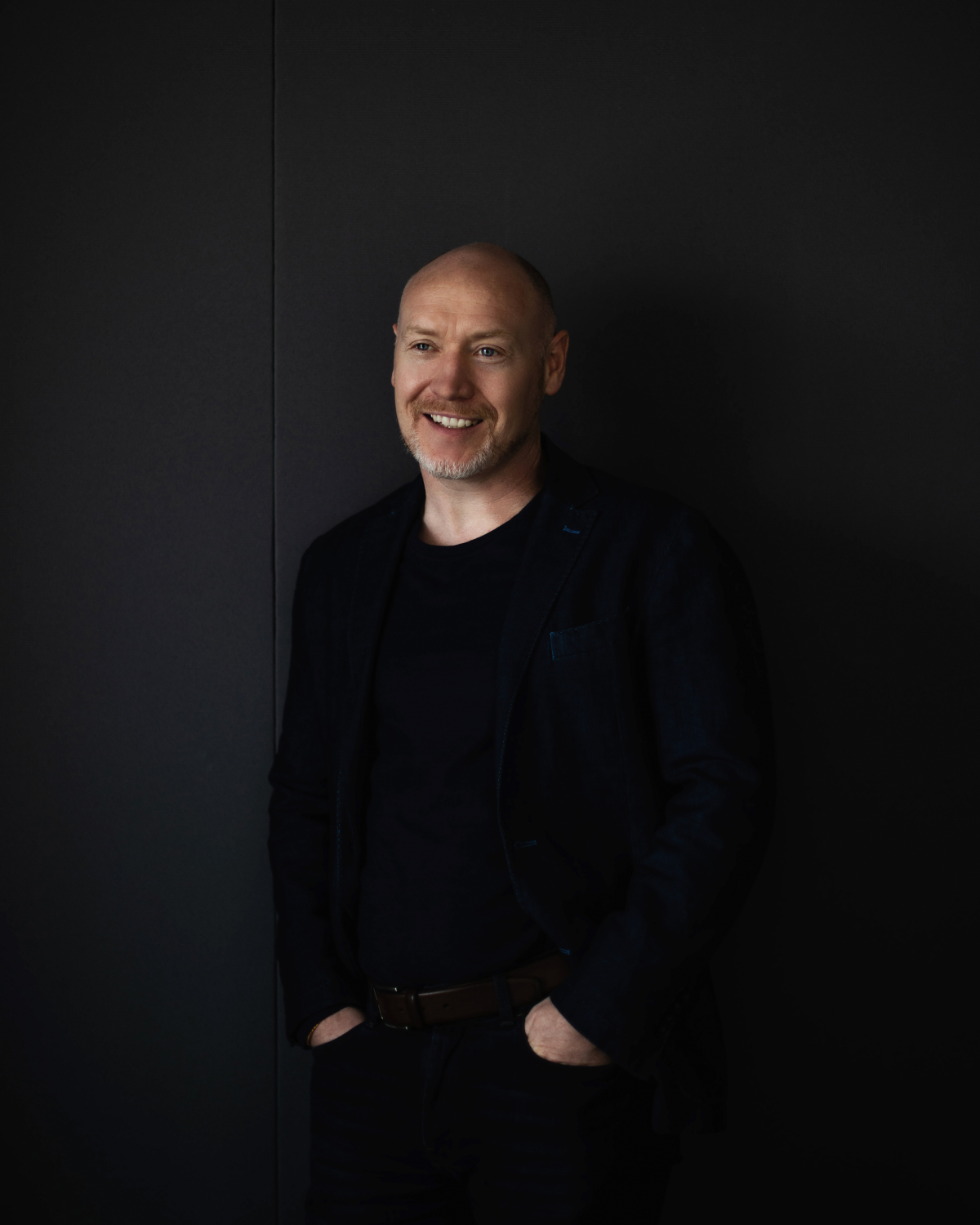
Even with the unseen challenges on a global stage, where the situations became very disruptive and a sense of being normal will be changing its definition with the end of 2020, RSP Dubai has coped up with the situation with an undying enthusiasm. With all the new barriers that the present century had never seen, the sudden lockdown while it brought the challenges of being isolated, has also given the new bright direction of still being connected virtually and keep innovating.
Luckily enough, with the slow and steady opening of offices and public spaces, WAC's UAE Reporter Biswajit Chakrabarty was able grab the opportunity to sit down with Michael Magill, Managing Director of RSP’s Middle East Operations in Dubai, and discuss about his design approaches and thoughts on architecture.
Read the edited version of the transcript of WAC's interview with Michael Magill below:
Biswajit Chakrabarty: A very warm welcome to the World Architecture Community, and thank you for the time. We would like to start the discussion with congratulating you on your win in the Interior Design awards for BAPS-HINDU Mandir. You also once again are in the Top 15 designers of Middle East, and really big congratulations on your "Architect of the Year 2020 Award". Quite a sweet end to the year.
Michael Magill: Thank you very much, and really happy to sit down for the discussion, thank you for arranging and taking out the comfortable time too. I am really passionate about design and any opportunity to talk about design is always a pleasure. Designing here at RSP is always a joy for me.
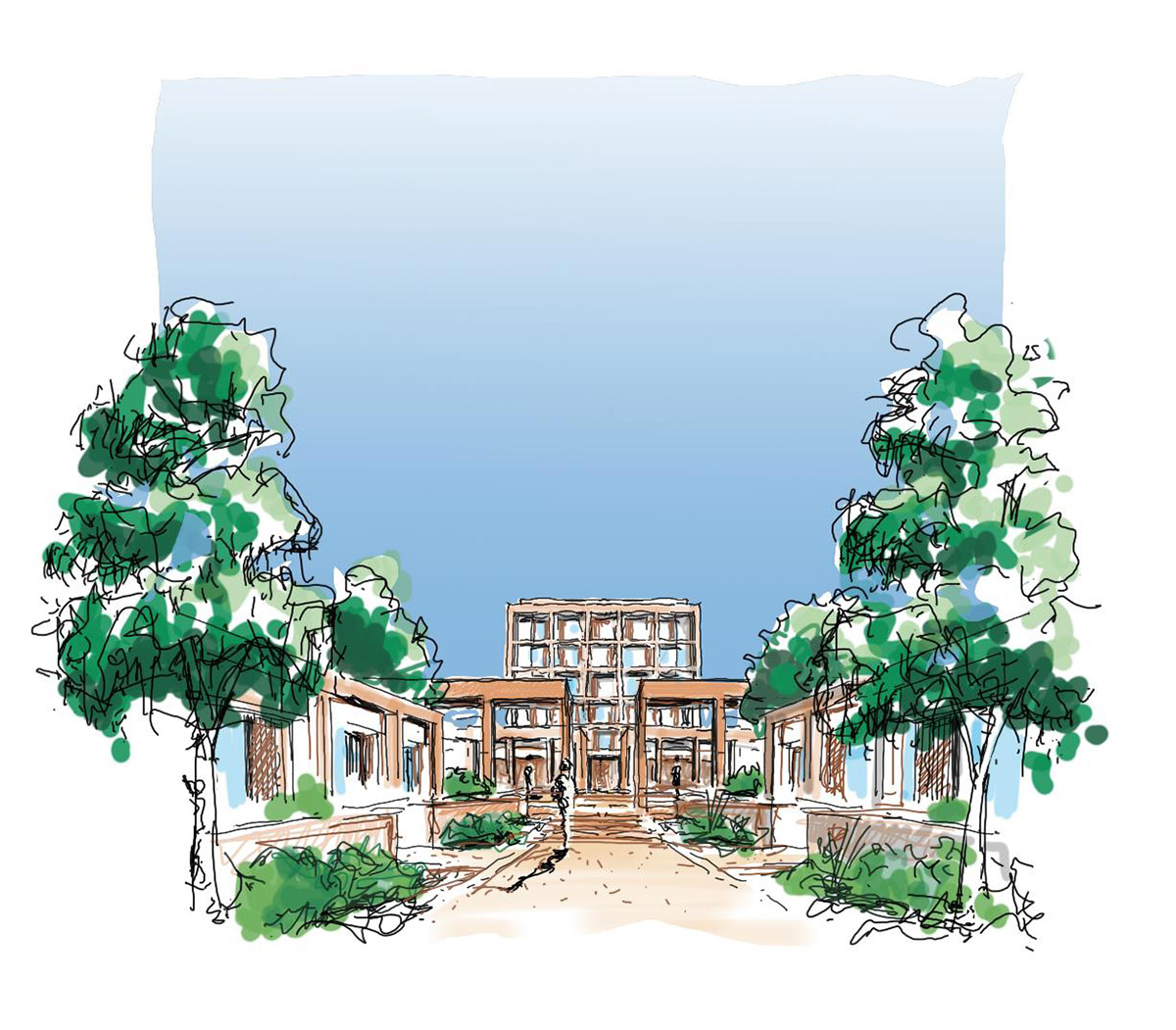
Conceptual Sketch by Michael Magill. Image courtesy of RSP
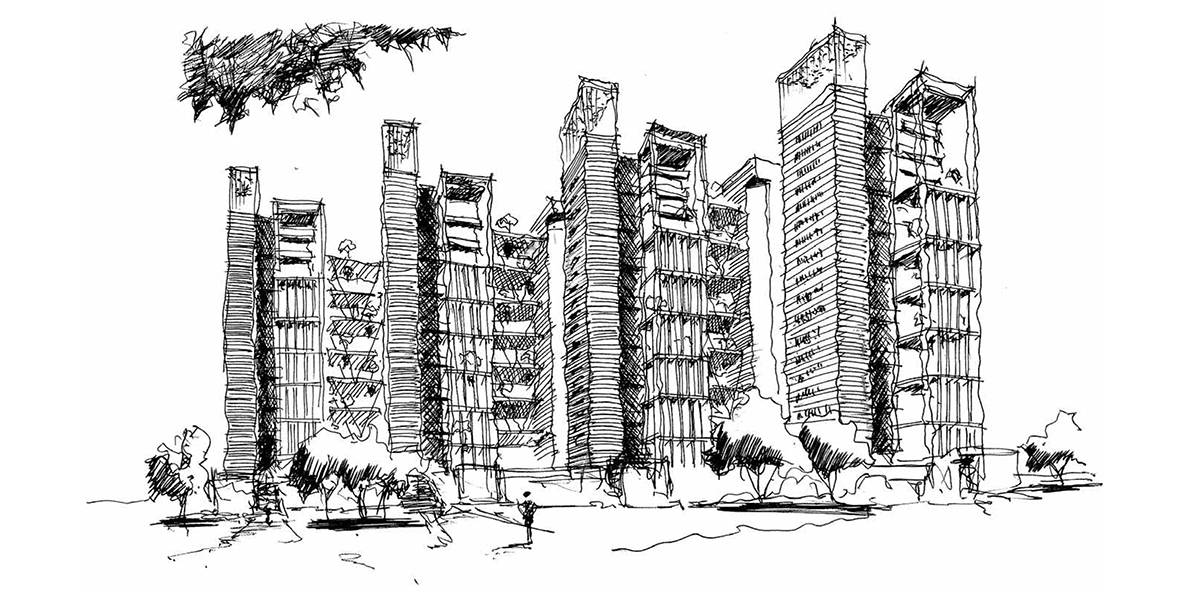
Conceptual Sketch for Reflections, Chennai, India (Residential Project) by Michael Magill. Image courtesy of RSP
Biswajit Chakrabarty: So quickly diving into the first question. How does an idea or approach for any project come to be?
Michael Magill: Here at RSP, currently at this moment we have ongoing projects that are at Cambodia, Moscow, Beijing, Saudi Arabia, and UAE so, as designers what we get to experience here is being exposed to various types of projects in terms of functioning sectors and geographical locations. Many of them are public and commercial projects and some residential and institutional. So, for us to develop and respond to all these varying conditions, we always come back to most important thing which is "people".
When we first look at a project, we look deep into the culture, we look at the people, and we look into what we can achieve in the project to enhance the experience of people. How we link the people into our design process is as people come in through the life style of the project, they come in through the mood and emotions of a project's design, and the feelings that our design will bring into a space. These all process become very visionary and high level, but we are not just designing buildings but actually what we design are experiences. This is what drives us.
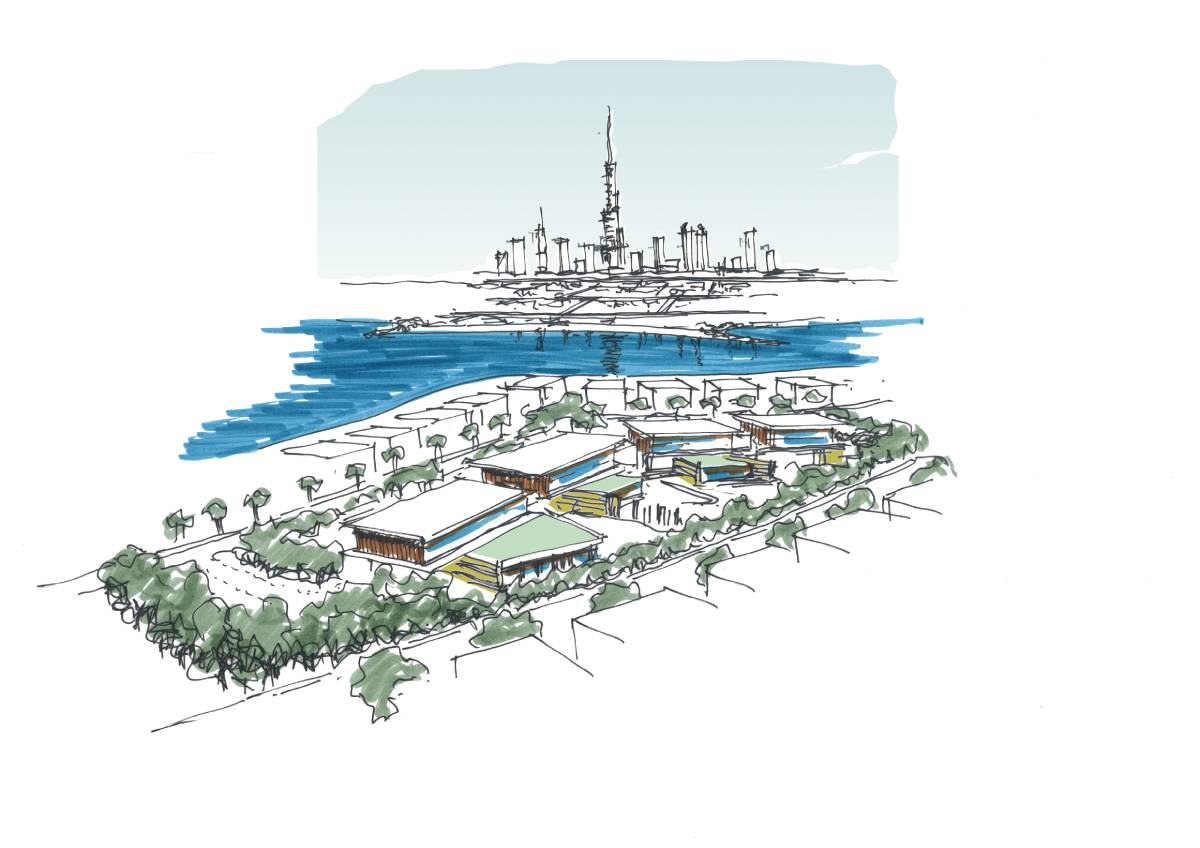
Conceptual Sketch for Wellness Hotel by Michael Magill. Image courtesy of RSP
Biswajit Chakrabarty: So eventually it is about designing the cultural exchange opportunities through your designs.
Michael Magill: Exactly, so it becomes a combination of culture of the area, like we have recently designed a project in a place called Haiko which is tropical island in the South China sea. In this what we looked at, is the culture of the island, the different vernacular opportunities through that island. On a total contrast to this another large retail project that we are involved in that requires us create a high-end life style exposure and make it a destination point. So it is important to start any project with two points in mind, culture and experience.
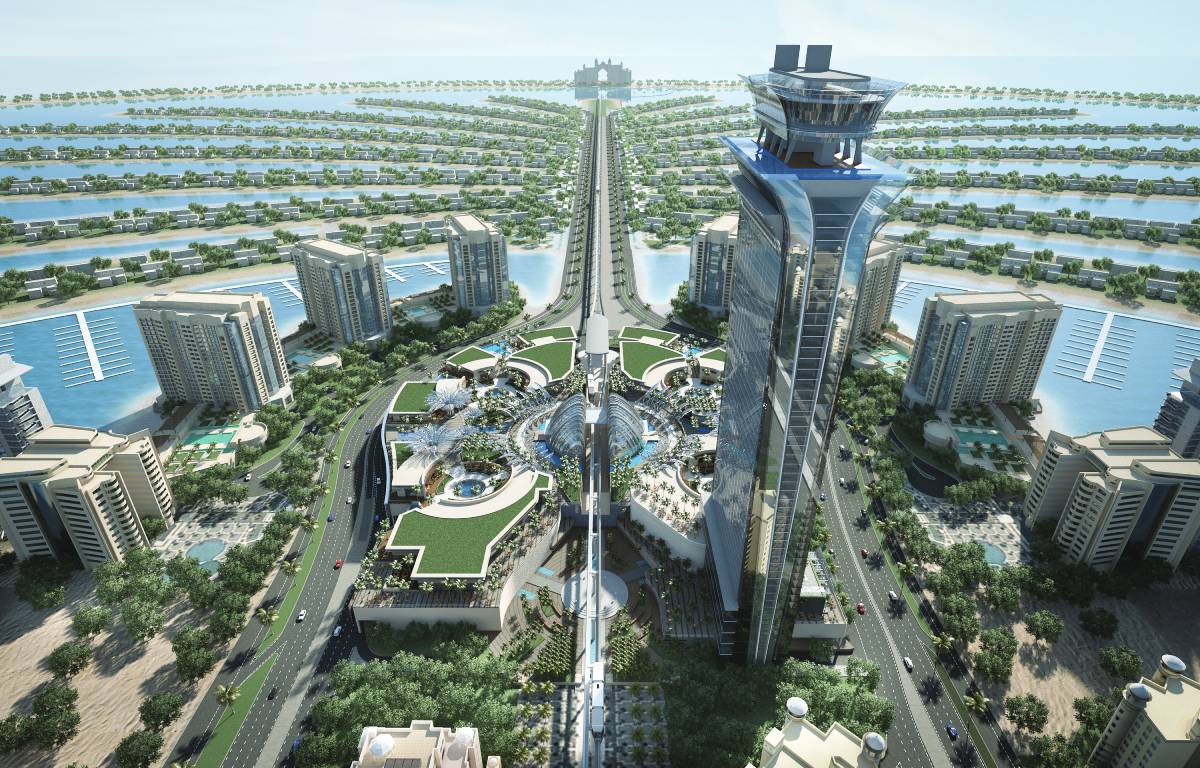
Nakheel Mall & The Palm Tower. Image courtesy of RSP
Biswajit Chakrabarty: What is the ultimate dream and mission of RSP?
Michael Magill: For us here at RSP it is about the people inside RSP, because here we are all designers and it is about giving those designers the opportunity to embrace the ideals of RSP in terms of how we approach any design and how we look at a project. When we look at a project and someone comes to us with a dream to build, we here as the team of designers come together, and we drive the design vision in terms of experiences and culture. So, and eventual dream that I personally have here is to develop a growing team of enthusiastic designers & engineers around the approach of design and to do more projects internationally to grow our portfolio with unique typologies. There are many design firms that have found their specific niche and just stick to that particular, but we here at RSP are driven to embrace and welcome all functioning sectors and because of which we are designing hospitality projects, residential projects, commercial projects, masterplan projects, retail projects and many more. So what we have done is actually kept quite a flexible canvas.
Biswajit Chakrabarty: What do you think the biggest trends and developments will be in the next five years for the Middle East?
Michael Magill: Collaboration, integration of design in all stages of works would be very important. A platform where technical viabilities and designs are simultaneously taking place and the coordination of technical knowledge with creativity is on a single platform.
RSP has been leaving its unique footprint through its design approaches around the globe and have been efficiently involved in developing the ever-growing futuristic & unique skyline of Dubai and many countries. In Dubai the upcoming Palm Tower in the center of the Palm island, the Nakheel Mall, BAPS-HINDU Mandir Abu-Dhabi, Interiors for the Rove hotel at EXPO-2020 and many more. With all the various projects the internal development of our team in regards of technology and new approaches has also grown, the same has to go for all.
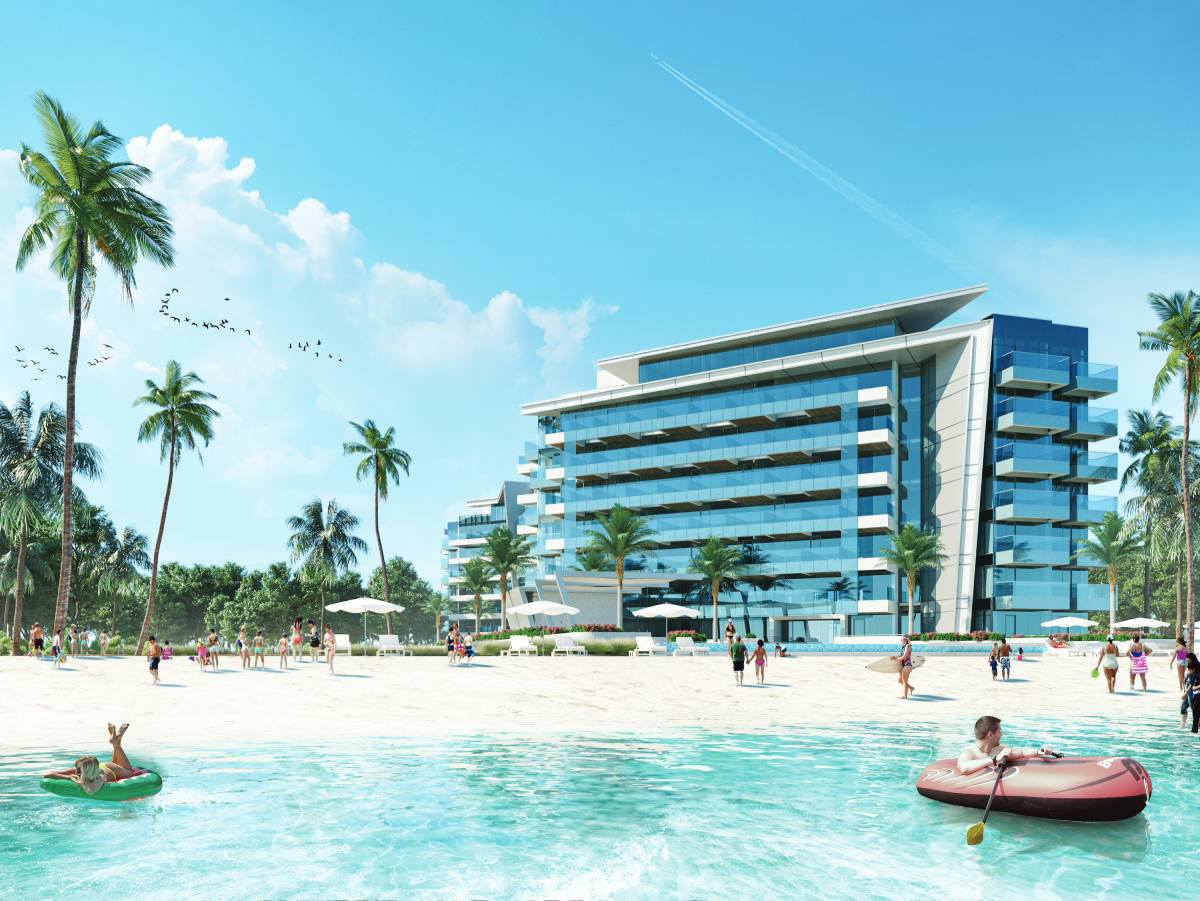
Nirvana Residential Building. Image courtesy of RSP
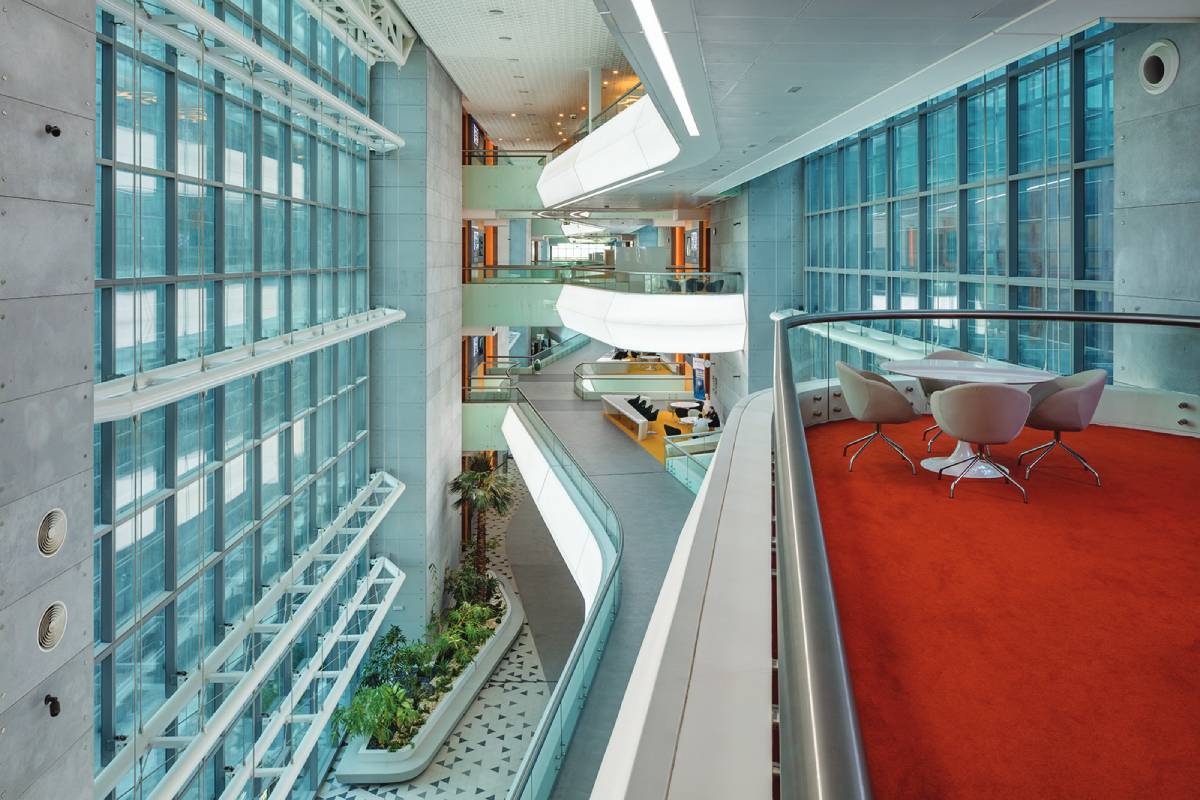
Khalifa University, Atrium Public space. Image courtesy of RSP
Biswajit Chakrabarty: How are the standards defined by your approach in design going to change, guide and prepare the future upcomers?
Michael Magill: As mentioned earlier, what we focus on is the culture and experience. While these two points always sit at the center of any conceptual development, this roots out to various ideas that justify why people would be interested to visit these places and how our designs really co-relate to the public. Sometimes the most complex problems seem to have the simplest solutions and that's how we approach to any project and its conceptualization.
Biswajit Chakrabarty: How much of your time is invested in promoting the awareness of the current changes in client requirements and timelines that any project asks for?
Michael Magill: I have always believed as a designer a part of us always has to stay alive as a teacher. Consciously or sub-consciously as designers it is our goal to stay updated with the ever evolving world of new technologies and design schemes that profit clients on long terms. All these studies have always been included in our presentations as its core part.
Biswajit Chakrabarty: How does technology and digital transformation impact the industry for setting an example?
Michael Magill: I have always believed technology and design walk hand in hand at all times. Here at RSP, we have been adapting and improvising on this collaboration very effectively. With 2020 that brought Covid-19 situation, it somehow accelerated the adaptation and awareness of digital connection globally. We were lucky enough to be on this path for quite a while now, the simplest things like small team meetings with team and clients at any time has been possible. This has also made it easy to share my personal screen with everyone live and sketch out the concepts and inceptions we are trying create. All these can be recorded and documented for future references.
One of the effective approaches that recently RSP incorporated is enhancing the user experience of their conceptual design stage through Virtual Reality. RSP Dubai took the challenge of adding VR to their technical models for the BAPS-HINDU Mandir which led to the clients experiencing the project in a 1:1 scale and advise some effective suggestions for changes and understand the project easily. This also enhanced the design capabilities for the team working on it, as the design team could also navigate through the tiniest details and add more intricacies to the designs, which have led to effective pre-construction workflows for better coordination and collaboration on and off site.

Cafeteria, BAPS-HINDU Mandir. Image courtesy of RSP

Library, BAPS-HINDU Mandir. Image courtesy of RSP
Biswajit Chakrabarty: What is your ultimate goal as and individual and as a leader for the betterment of the AEC industry?
Michael Magill: I have always had the approach to giving an open stage for knowledge sharing and bringing in effective ideas to life, eventually here at RSP, it is about team work and collaboration. Design for us is not just a stage but a link that justifies at all steps of a project. I dream of creating a team of designers and engineers that co-exist under one roof who have embraced the core fundamentals we believe in here at RSP and take the initiative forward with their creativity. RSP is a firm spread through out the globe, it makes out to be a living human library as every individual have their own ethnicity and culture. This helps us to co-relate and design fresh. Anyone can design a building, we design experiences.
Biswajit Chakrabarty: How have you balanced the need of the end-user with your unique approaches?
Michael Magill: As important as design is to any project, there is always the co-relating part that orients towards the finances and profitability hence even at our design stages, we include studies of the local market and the required economical studies. This simply adds on better opportunity for us to find the references on which we can provide the best solutions to our clients.
Biswajit Chakrabarty: Could please provide us a brief overview of the responsibilities you have taken towards changing the mindset of the public towards clean energy?
Michael Magill: Well with the design initiations of the BAPS -HINDU Mandir, the whole complex being on the out skirts of ABU-Dhabi in midst of a dessert, the project already has its challenges on the power supplies. What we have included from the day one in our design are solar panels in the parking complex that will provide a good amount to natural power consumptions for the project on long terms. We have also added proper studies justifying the use of solar panels, that really gave the clients a much clearer picture.
We also strongly believe in modular constructions system that actually reduces a lot of on-site works and wastage and eventually adds on a profitable circular economy in the project cost. The central temple of BAPS-HINDU Mandir is being built back in India on block basis which later on will be import all the way to the site in ABU-Dhabi. While all the other structures around the complex are also using modular and pre-fabricated materials.

BAPS-HINDU Mandir Complex. Image courtesy of RSP
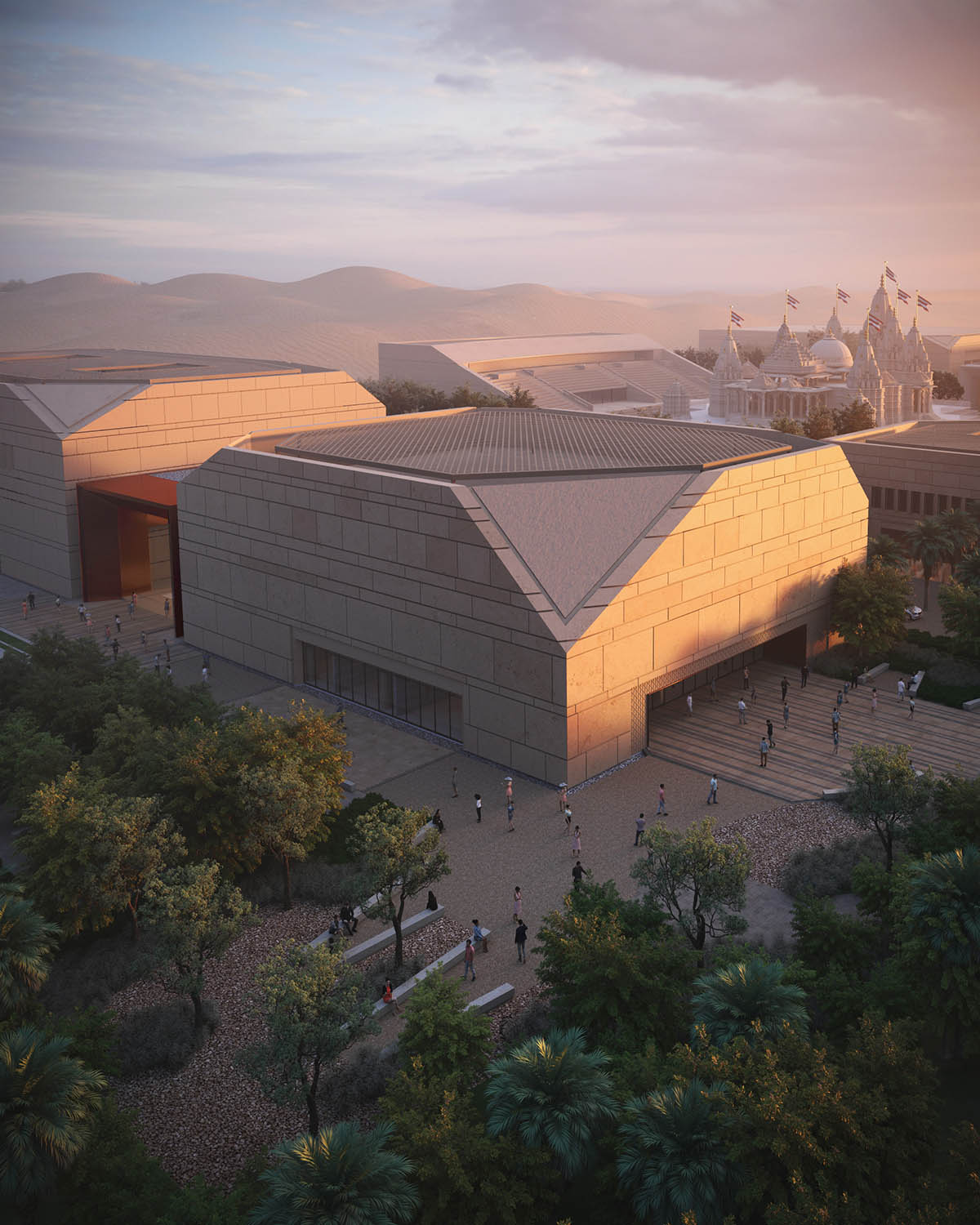
Entrance Complex to BAPS-HINDU Mandir. Image courtesy of RSP

Entrance Lobby to BAPS-HINDU Mandir. Image courtesy of RSP
Biswajit Chakrabarty: How have you balanced the scale of giving equal importance to all the projects at all times?
Michael Magill: Its all about team work and having the right people on the right job at the particular time. As I mentioned, we are working on multiple projects with different sectors and spread globally, and so is RSP and that helps us to communicate with the right individual who has the expertise in the particular stream so the outputs are to the point. If we are getting into a hospitality project, we will bring in the experts who are well experienced and informed in the hospitality projects and have them lead the way.
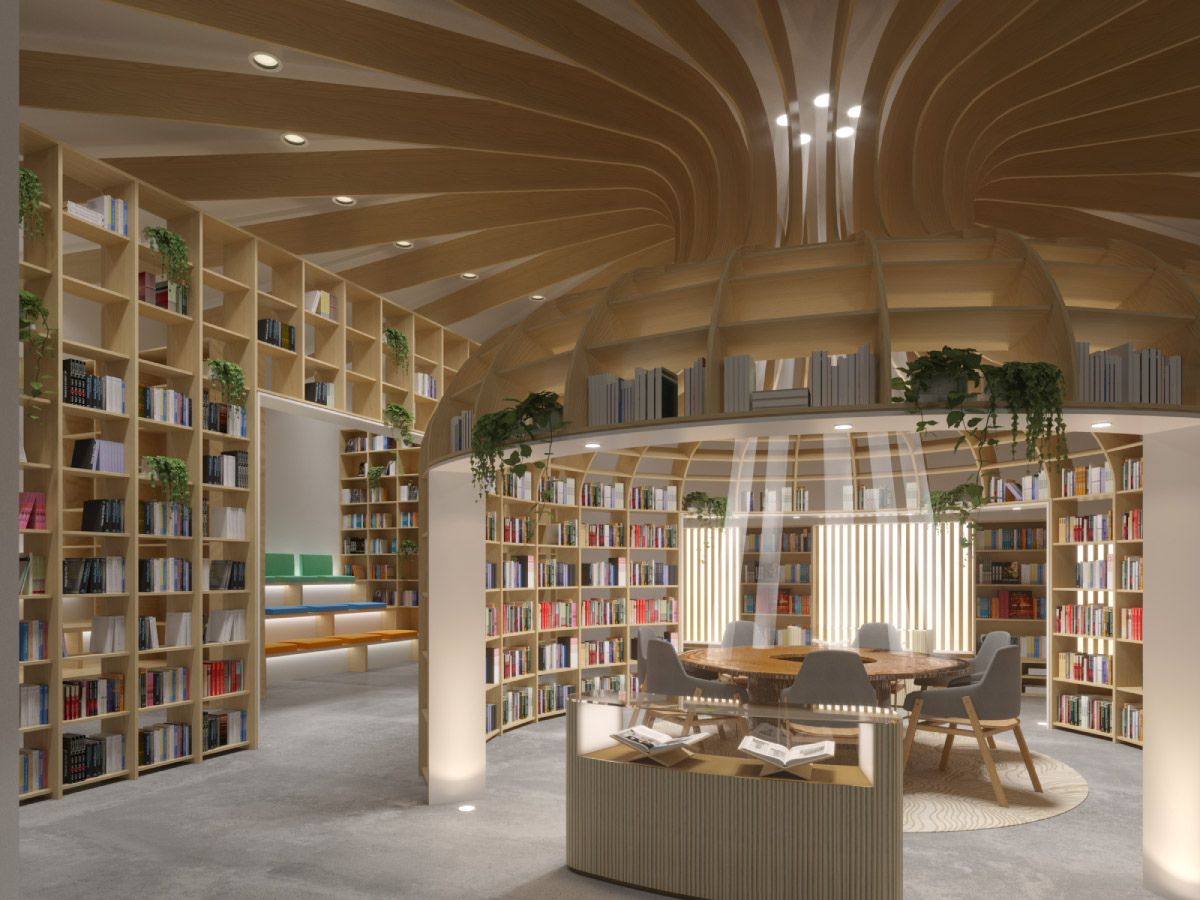
Public Library BAPS-HINDU Mandir. Image courtesy of RSP
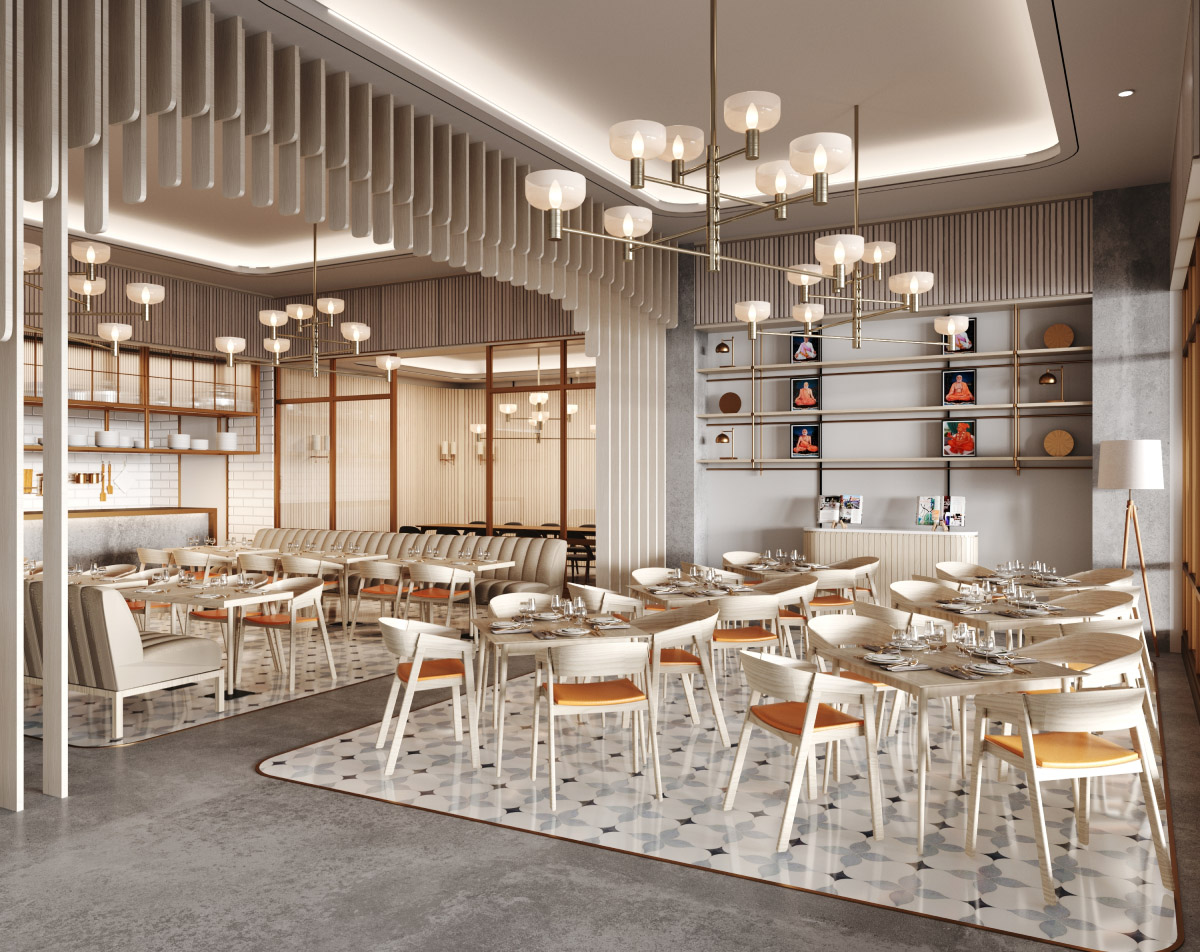
Restaurant, BAPS-HINDU Mandir. Image courtesy of RSP
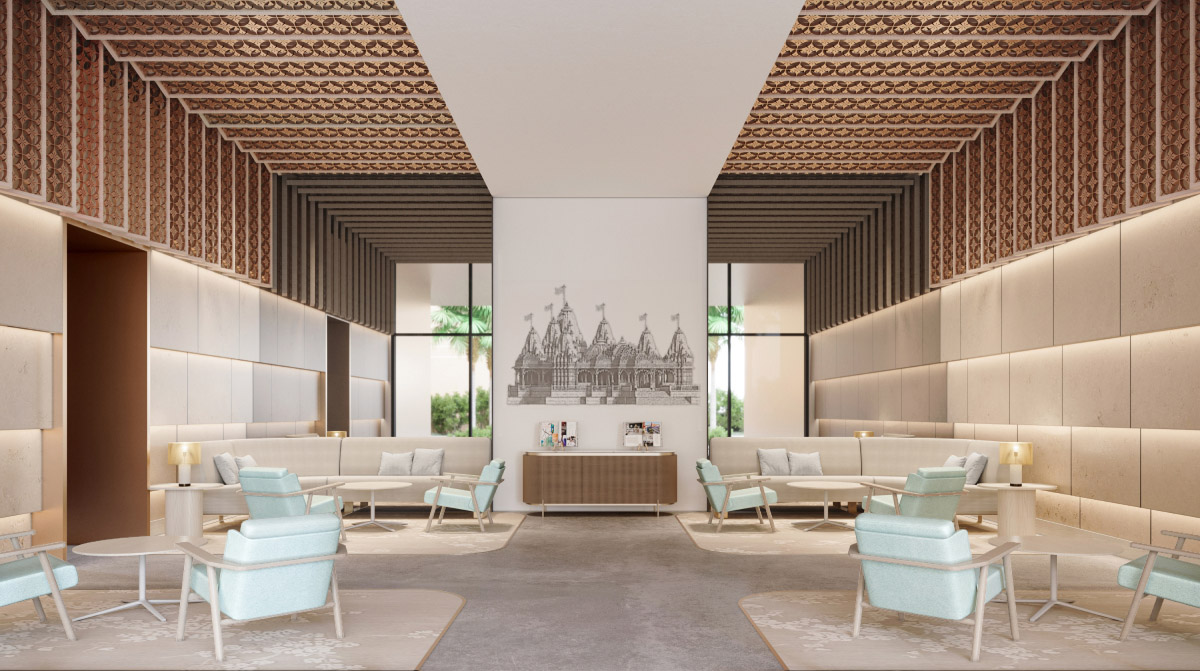
Waiting Area to BAPS-HINDU Mandir. Image courtesy of RSP
Biswajit Chakrabarty: A project like BAPS-HINDU Mandir, is more of a cultural integration of religious buildings. How have you managed to balance that?
Michael Magill: As unique as the project in it self is, the site location is so too. It’s a religious project of exhibiting the Hindu culture to the international crowd, so here again the most import aspects were the “People and Exhibition” and enhancing the experience for the people who visit the place. A showcase for the social enhancement of Hindu Culture to all the other cultures. Interestingly the whole project is in midst of a dessert and in the Middle East, making its location a very unique yet challenging too in all aspects may it be design or technical viabilities. The overall goal is to attract people from all around the world, create harmony, solidify more of its global relations with multiple countries. At a deeper level the design includes so many design types, i.e.
- Architectural Design
- Social economic Design
- Technical Designs
- Global approach & Marketing design
While we did start our design with our design team, we also had our technical experts too working with us side by side. For the whole project used BIM (Building Information Modeling), this had added advantage to have a single model for design and technical coordination.
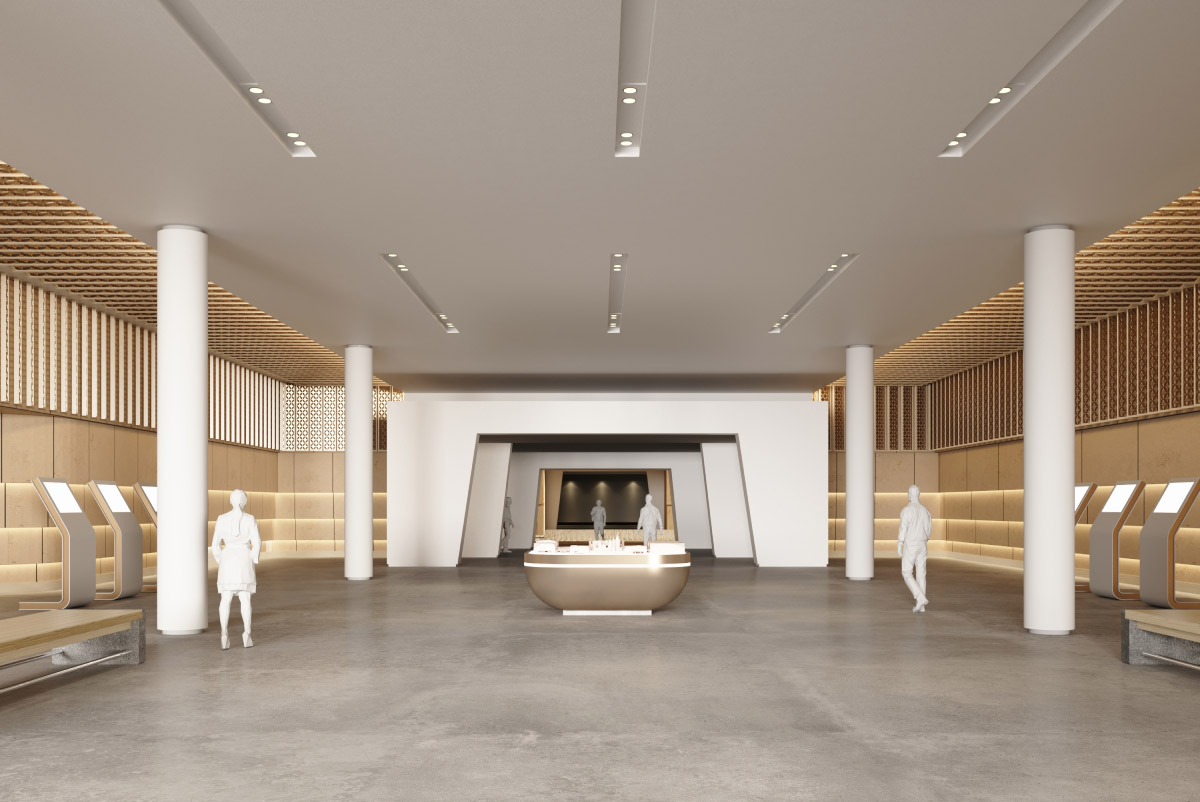
Reception, BAPS-HINDU Mandir. Image courtesy of RSP
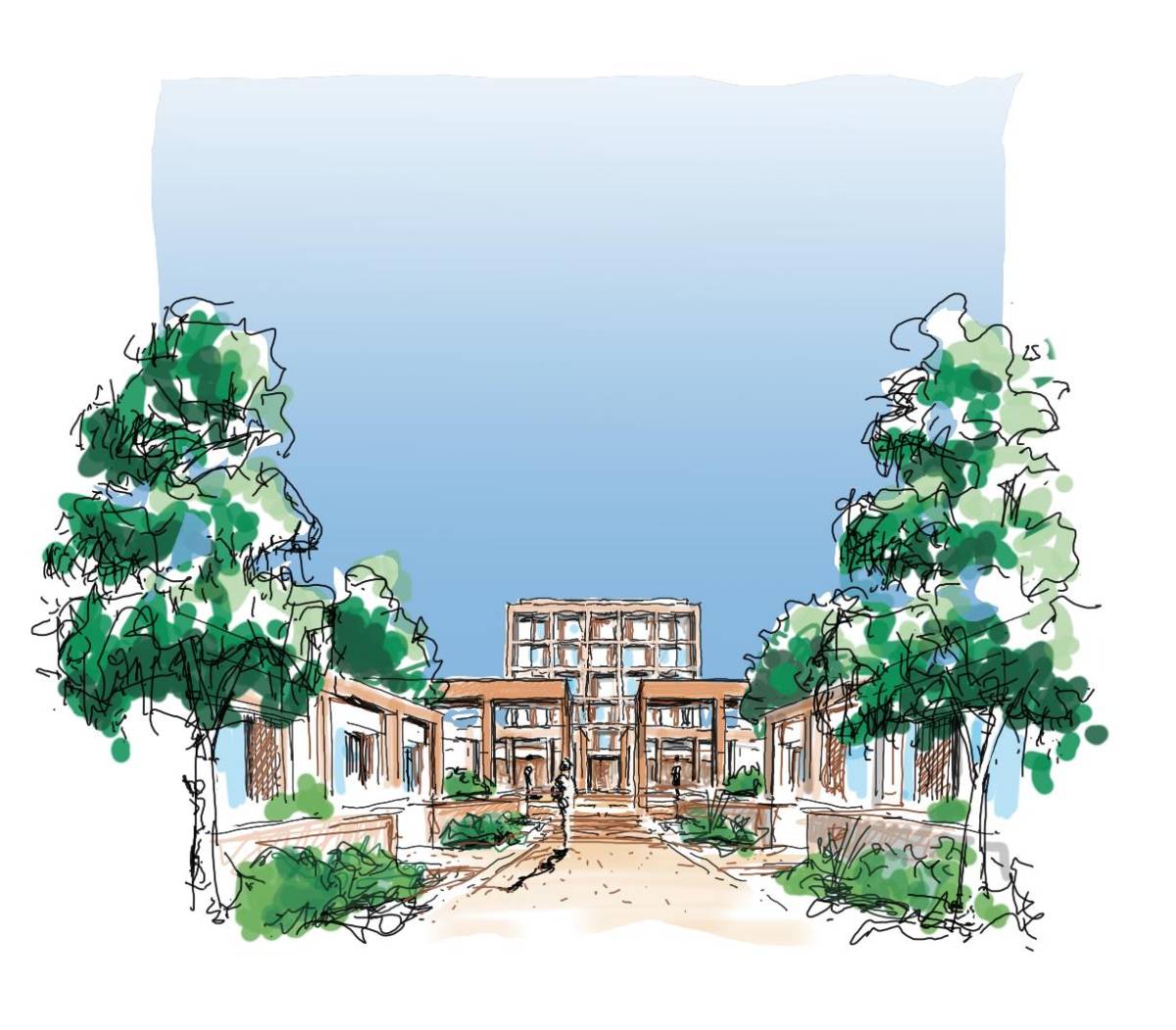
Conceptual Sketch of Street Kalba by Michael Magill. Image courtesy of RSP
Biswajit Chakrabarty: What are the key factors that make your designs different and unique?
Michael Magill: As I have been saying "People", "Culture", & "Experience" are core that we always believe in while designing. We design experiences. Very effectively what I would advise is to always keep in mind that; "Design happens at every stage, it is a process".
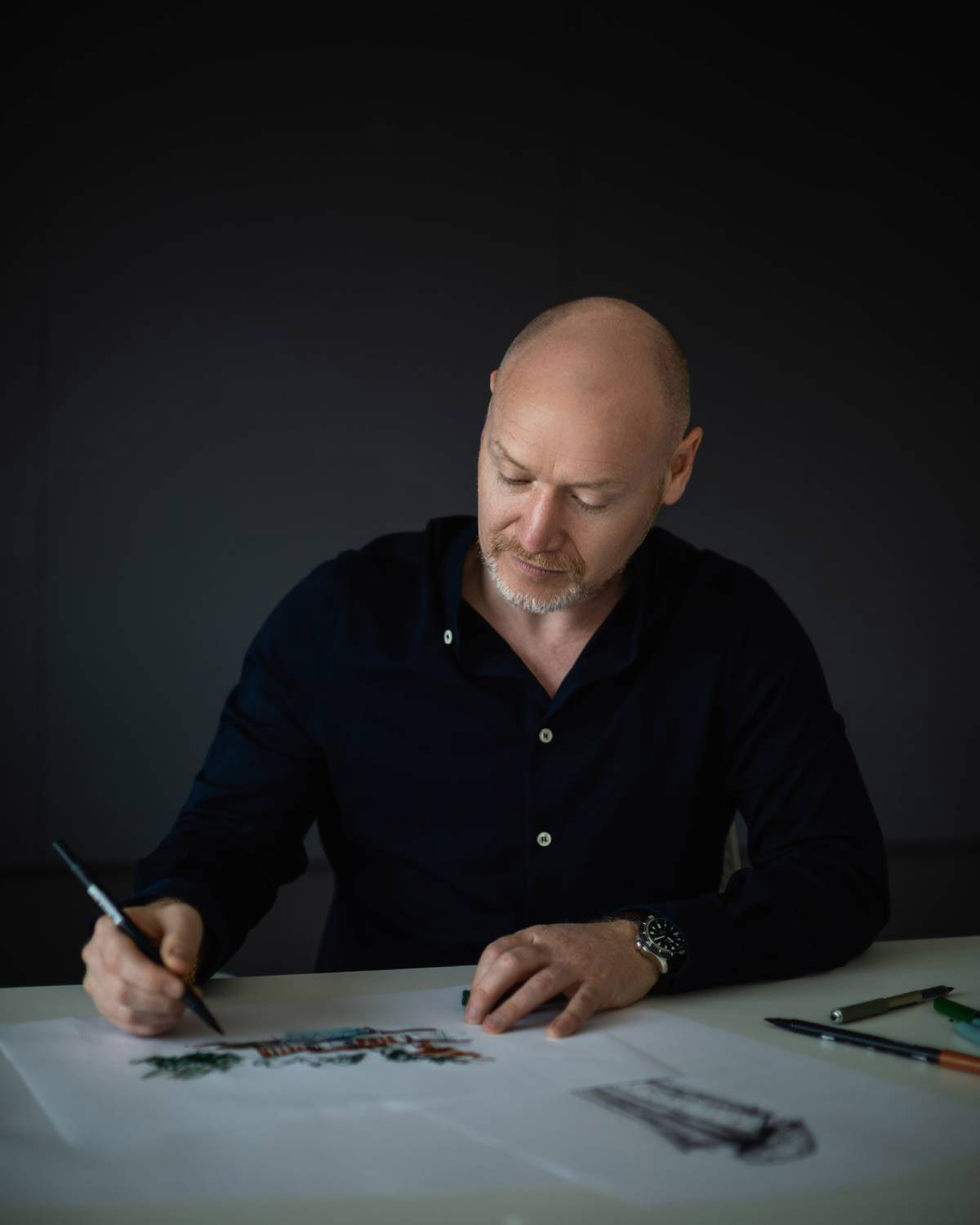
Ar. Michael Magill Managing Director/Creative Director RSP Dubai. Image courtesy of RSP
Top Image: Ar. Michael Magill Managing Director/Creative Director RSP Dubai. Image courtesy of RSP
